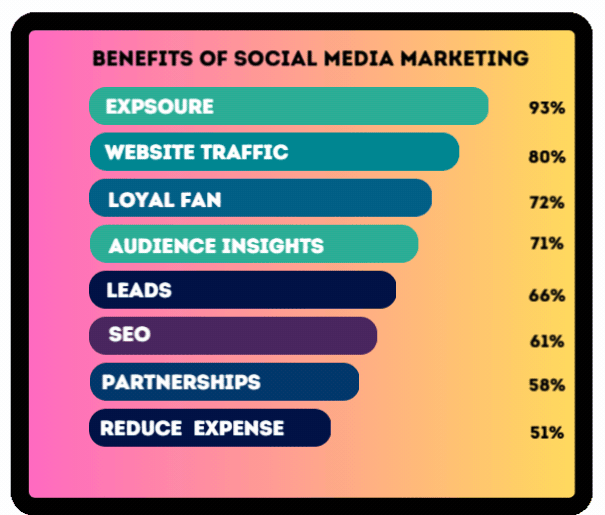What is Social Media Marketing? | Benefits of Social Media Marketing

Social media marketing refers to the process of utilizing social media platforms to promote and market products or services. It involves creating and sharing content on social media networks to engage with the audience, increase brand awareness, drive traffic, and generate leads or sales. In essence, social media marketing harnesses the power of social media platforms to achieve marketing objectives.
What you’ll learn in this guide:
- What is Social Media Marketing?
- Benefits of Social Media Marketing
- Social Media Marketing Statistics
- Social Media Marketing Strategy
- Creating Your Social Media Marketing Plan
- Social Media Marketing Tips
- The Best Social Media Marketing Platforms
What is Social Media Marketing?
Social media marketing has emerged as a powerful tool for businesses to connect with their audience, drive engagement, and achieve their marketing goals. But what exactly is social media marketing?

In essence, social media marketing involves leveraging social media platforms to promote products or services. It encompasses a range of activities, including creating and sharing content, engaging with followers, running advertisements, and analyzing data to optimize performance. This multifaceted approach enables businesses to build brand awareness, foster customer relationships, and drive conversions.
Benefits of Social Media Marketing
Social media marketing offers a plethora of advantages for businesses of all sizes.

H3-Here’s a more detailed exploration of the benefits:
- Increased Brand Visibility: Social media platforms serve as virtual hubs where billions of users converge daily. By establishing a presence on these platforms, businesses can significantly expand their reach and visibility. Regularly sharing content and engaging with the audience increases brand exposure, ensuring that more people become aware of your products or services.
- Enhanced Customer Engagement: Unlike traditional marketing channels, social media allows for direct interaction with customers. Through comments, messages, and polls, businesses can engage in meaningful conversations with their audience. This engagement fosters a sense of community and loyalty, as customers feel valued and heard by the brand.
- Targeted Advertising: Social media platforms provide sophisticated targeting options that enable businesses to reach specific demographics with precision. From age and location to interests and behaviors, businesses can tailor their advertisements to resonate with the most relevant audience. This targeted approach maximizes the effectiveness of marketing campaigns and minimizes wasted ad spend.
- Cost-Effectiveness: Compared to traditional advertising channels like television or print media, social media marketing offers a more cost-effective solution. Many social media platforms offer free sign-up and basic features, allowing businesses to start marketing with minimal investment. Additionally, paid advertising on social media tends to be more affordable than traditional advertising, making it accessible to businesses of all sizes.
- Insightful Analytics: Social media platforms provide comprehensive analytics tools that allow businesses to track the performance of their marketing efforts in real-time. From engagement metrics like likes and shares to conversion metrics like click-through rates and conversion rates, businesses can gain valuable insights into the effectiveness of their campaigns. These insights enable data-driven decision-making and optimization, ensuring that marketing efforts yield the best possible results.
- Improved Customer Satisfaction: Social media platforms serve as convenient channels for customer support and feedback. By promptly addressing customer inquiries, concerns, and complaints on social media, businesses can enhance customer satisfaction and loyalty. Positive interactions on social media can turn satisfied customers into brand advocates who promote the business to their own networks, further amplifying its reach and impact.
- Competitive Advantage: In today’s digital age, having a strong presence on social media is no longer optional—it’s essential for staying competitive. Businesses that effectively leverage social media marketing can differentiate themselves from competitors, establish authority in their industry, and attract customers who are increasingly turning to social media for product research and recommendations.
In essence, the benefits of social media marketing extend far beyond mere brand promotion. By fostering engagement, targeting the right audience, and leveraging data-driven insights, businesses can drive tangible results and achieve their marketing objectives more effectively than ever before.
Social Media Marketing Statistics

Understanding the statistics behind social media marketing is crucial for businesses to make informed decisions and optimize their strategies.
Here’s a detailed exploration of key statistics in the realm of social media marketing:
- Global Reach: Social media platforms boast staggering user numbers, making them indispensable for businesses looking to expand their reach. With over 4.66 billion active social media users worldwide as of 2021 (Statista), these platforms offer unparalleled potential for businesses to connect with their target audience on a global scale.
- Mobile Dominance: Mobile devices have become the primary gateway to social media for billions of users around the world. According to Statista, approximately 99% of social media users access platforms via mobile devices. This trend underscores the importance of mobile optimization for social media marketing strategies, ensuring that content is easily accessible and engaging on smartphones and tablets.
- Engagement Metrics: Engagement metrics such as likes, shares, comments, and retweets provide valuable insights into the effectiveness of social media marketing efforts. According to Sprout Social, the average engagement rate per post across all industries on Instagram is 1.22%, highlighting the importance of creating compelling content that resonates with the audience and encourages interaction.
- Video Content: The rise of video content on social media platforms has revolutionized the way businesses engage with their audience. According to HubSpot, 54% of consumers want to see more video content from brands they support. Platforms like YouTube and TikTok have experienced explosive growth in recent years, offering businesses opportunities to showcase their products or services through engaging video content.
- Influencer Marketing: Collaborating with influencers has become a popular strategy for businesses to reach new audiences and build credibility. According to Mediakix, the influencer marketing industry is projected to be worth $13.8 billion in 2021. Partnering with influencers who align with their brand values allows businesses to leverage the influencers’ existing following and authenticity to promote products or services effectively.
- E-commerce Integration: Social media platforms are increasingly becoming e-commerce destinations, allowing businesses to sell products directly to consumers without the need for a separate website. According to eMarketer, global social commerce sales are expected to reach $604.5 billion by 2024, highlighting the growing importance of social media as a sales channel for businesses.
- Ad Spend: Businesses are allocating a significant portion of their marketing budgets to social media advertising, recognizing its effectiveness in reaching and engaging target audiences. According to Statista, global social media advertising spending is projected to reach $110 billion in 2021. This substantial investment underscores the importance of social media advertising as a key component of comprehensive marketing strategies.
- ROI Measurement: Measuring the return on investment (ROI) of social media marketing efforts is essential for demonstrating the effectiveness of campaigns and optimizing resource allocation. According to Buffer, 73% of marketers agree that demonstrating ROI is their top challenge. Implementing robust analytics tools and tracking key performance indicators (KPIs) allows businesses to quantify the impact of their social media marketing initiatives and make data-driven decisions.
By leveraging these insights and statistics, businesses can refine their social media marketing strategies, maximize their impact, and achieve their marketing objectives in an increasingly competitive digital landscape.
Social Media Marketing Strategy

Developing a robust social media marketing strategy is essential for businesses to effectively leverage the power of social media platforms and achieve their marketing objectives.
Here’s a comprehensive exploration of key components and considerations in crafting a successful social media marketing strategy:
- Goal Setting: Begin by defining clear, specific goals for your social media marketing efforts. Whether it’s increasing brand awareness, driving website traffic, generating leads, or boosting sales, establishing measurable objectives provides a roadmap for success and ensures that efforts are aligned with overarching business goals.
- Audience Research: Gain a deep understanding of your target audience by conducting thorough research into their demographics, interests, behaviors, and pain points. This information allows you to tailor your content and messaging to resonate with your audience and effectively engage them on social media platforms.
- Platform Selection: Choose the social media platforms that align with your target audience and business objectives. Consider factors such as demographics, platform features, and content formats to determine where your audience is most active and where your content is likely to perform best.
- Content Strategy: Develop a comprehensive content strategy that outlines the types of content you will create and share on each platform. This may include a mix of educational articles, entertaining videos, engaging visuals, user-generated content, and promotional offers. Strive to provide value to your audience and foster meaningful interactions with your brand.
- Content Calendar: Create a content calendar to plan and schedule your social media posts in advance. A well-organized content calendar ensures consistency in posting frequency and helps you stay ahead of key dates, events, and trends relevant to your industry or audience.
- Engagement Plan: Implement an engagement plan to actively interact with your audience on social media. Respond promptly to comments, messages, and mentions, and initiate conversations to foster a sense of community and build relationships with your followers. Encourage user-generated content and leverage user testimonials to amplify your brand’s reach and credibility.
- Paid Advertising Strategy: Incorporate paid advertising into your social media marketing strategy to amplify your reach and target specific audience segments. Utilize advanced targeting options offered by social media platforms to reach users based on demographics, interests, behaviors, and purchasing intent. Monitor ad performance closely and adjust your targeting and messaging based on real-time data and insights.
- Monitoring and Analysis: Regularly monitor the performance of your social media marketing efforts using analytics tools provided by social media platforms and third-party analytics solutions. Track key performance indicators (KPIs) such as engagement metrics, reach, impressions, click-through rates, conversion rates, and return on investment (ROI). Use these insights to identify trends, assess the effectiveness of your strategy, and make data-driven optimizations to improve results over time.
- Iterative Optimization: Social media marketing is an iterative process that requires continuous testing, learning, and optimization. Analyze the performance of your content, ads, and overall strategy, and iterate based on what works best for your audience. Experiment with different content formats, posting times, ad creatives, and targeting parameters to refine your approach and maximize your impact on social media platforms.
By following these steps and considerations, businesses can develop a comprehensive social media marketing strategy that effectively engages their target audience, drives meaningful interactions, and achieves tangible results in line with their business objectives.
Creating Your Social Media Marketing Plan

Crafting a well-thought-out social media marketing plan is essential for businesses to effectively leverage social media platforms and achieve their marketing objectives.
Here’s a detailed exploration of key steps and considerations in creating a successful social media marketing plan:
- Define Your Objectives: Begin by clearly defining your objectives and goals for social media marketing. Whether it’s increasing brand awareness, driving website traffic, generating leads, boosting sales, or improving customer engagement, setting specific, measurable, achievable, relevant, and time-bound (SMART) goals provides direction and focus for your efforts.
- Understand Your Audience: Conduct comprehensive research to gain a deep understanding of your target audience. Identify their demographics, interests, behaviors, pain points, and online habits to tailor your social media marketing strategy and content to resonate with your audience effectively.
- Choose the Right Platforms: Select the social media platforms that align with your target audience and business objectives. Consider factors such as demographics, platform features, content formats, and industry relevance to determine where your audience is most active and where your content is likely to perform best.
- Audit Your Existing Presence: Conduct an audit of your current social media presence to assess strengths, weaknesses, opportunities, and threats (SWOT). Evaluate your current follower count, engagement levels, content performance, brand consistency, and competitor presence to identify areas for improvement and optimization.
- Set Key Performance Indicators (KPIs): Establish key performance indicators (KPIs) to measure the success of your social media marketing efforts. These may include metrics such as engagement rate, reach, impressions, follower growth, click-through rate (CTR), conversion rate, return on investment (ROI), and customer sentiment. Setting measurable KPIs allows you to track progress, evaluate performance, and make data-driven decisions.
- Develop a Content Strategy: Create a comprehensive content strategy that outlines the types of content you will create and share on each social media platform. Consider the preferences and interests of your target audience, as well as platform-specific features and best practices. Aim to provide value, entertain, educate, inspire, or inform your audience with compelling and relevant content.
- Establish a Content Calendar: Develop a content calendar to plan and schedule your social media posts in advance. A content calendar helps maintain consistency in posting frequency, ensures alignment with key dates and events, and allows for strategic content planning and coordination across platforms. Include a mix of curated content, original content, promotional posts, and engagement-focused content to keep your audience engaged and interested.
- Allocate Resources: Determine the resources and budget needed to execute your social media marketing plan effectively. This may include human resources for content creation, community management, and advertising management, as well as financial resources for paid advertising, tools, and software. Allocate resources strategically to maximize efficiency and effectiveness.
- Implement a Monitoring and Measurement Plan: Implement a robust monitoring and measurement plan to track the performance of your social media marketing efforts. Utilize analytics tools provided by social media platforms and third-party solutions to monitor key metrics, analyze trends, and gain insights into audience behavior and preferences. Regularly review performance data to identify areas for improvement, optimize campaigns, and make informed decisions.
- Iterate and Adapt: Social media marketing is an iterative process that requires continuous monitoring, learning, and adaptation. Regularly review and evaluate the effectiveness of your social media marketing plan, and be prepared to adjust your strategy based on changing market dynamics, audience feedback, and performance data. Experiment with new tactics, content formats, and advertising strategies to optimize results and stay ahead of the competition.
By following these steps and considerations, businesses can create a comprehensive social media marketing plan that effectively engages their target audience, drives meaningful interactions, and achieves measurable results in line with their business objectives.
Social Media Marketing Tips

Effectively harnessing the power of social media platforms requires a strategic approach and attention to detail.
Here are some advanced social media marketing tips to help businesses maximize their impact and achieve their marketing objectives:
- Focus on Quality Over Quantity: While consistency is important in social media marketing, prioritizing quality over quantity is key to capturing your audience’s attention and fostering meaningful engagement. Instead of bombarding your followers with a high volume of content, focus on creating high-quality, value-driven posts that resonate with your audience and encourage interaction.
- Leverage User-Generated Content: Encourage your audience to create and share content related to your brand or products. User-generated content (UGC) not only provides social proof and authenticity but also increases engagement and builds a sense of community around your brand. Showcase UGC on your social media profiles and engage with users who contribute content to foster loyalty and advocacy.
- Optimize for Mobile: With the majority of social media users accessing platforms via mobile devices, it’s essential to ensure that your content is optimized for mobile viewing and interaction. Use mobile-friendly formats, such as vertical videos and square images, and test your content across different devices and screen sizes to ensure a seamless user experience.
- Harness the Power of Video: Video content continues to dominate social media feeds and is highly effective in capturing attention and conveying messages. Experiment with various types of video content, such as tutorials, behind-the-scenes footage, product demos, and live streams, to engage your audience and drive engagement. Consider investing in video production tools and resources to elevate the quality of your video content.
- Engage Authentically: Authenticity is key to building trust and credibility on social media. Be genuine in your interactions with your audience, and avoid overly promotional or sales-driven content. Share behind-the-scenes glimpses of your brand, showcase the faces behind your business, and engage in transparent communication to humanize your brand and connect with your audience on a deeper level.
- Utilize Advanced Targeting: Take advantage of the advanced targeting options available on social media advertising platforms to reach specific audience segments with precision. Leverage demographic, interest, behavior, and location targeting to tailor your ads to the most relevant audience and maximize ROI. Experiment with custom and lookalike audiences to expand your reach and find new potential customers.
- Implement A/B Testing: Continuously optimize your social media marketing campaigns through A/B testing. Experiment with different ad creatives, messaging, targeting parameters, and call-to-action (CTA) buttons to identify what resonates best with your audience and drives the desired outcomes. Analyze performance data and iterate based on insights gathered from A/B tests to refine your strategy and improve results over time.
- Stay Up-to-Date with Trends: Social media is constantly evolving, with new features, trends, and algorithms shaping the landscape. Stay informed about the latest trends and updates in social media marketing by following industry news, attending webinars, and networking with other professionals in the field. Adapt your strategy to capitalize on emerging trends and maintain a competitive edge in the ever-changing social media landscape.
- Encourage Engagement: Actively encourage engagement with your content by asking questions, soliciting feedback, and prompting users to like, comment, share, and tag their friends. Respond promptly to comments, messages, and mentions, and engage in conversations with your audience to foster a sense of community and build relationships. Reward loyal followers with exclusive offers, discounts, or giveaways to incentivize engagement and loyalty.
- Measure and Analyze Results: Regularly monitor and analyze the performance of your social media marketing efforts using analytics tools provided by social media platforms and third-party solutions. Track key metrics such as engagement rate, reach, impressions, click-through rate (CTR), conversion rate, and return on investment (ROI) to evaluate the effectiveness of your campaigns. Use these insights to identify areas for improvement, optimize your strategy, and achieve better results over time.
By implementing these advanced social media marketing tips, businesses can elevate their presence on social media, drive meaningful engagement, and achieve their marketing objectives more effectively.
The Best Social Media Marketing Platforms

Selecting the right social media platforms is crucial for businesses to effectively reach their target audience, engage with customers, and achieve their marketing goals.
Here’s a detailed exploration of some of the best social media marketing platforms available:
- 1. Facebook:
- With over 2.8 billion monthly active users, Facebook remains the largest and most widely used social media platform globally.
- Facebook offers robust advertising and targeting options, allowing businesses to reach specific demographics based on factors such as age, location, interests, and behavior.
- The platform supports various content formats, including text posts, images, videos, and live streams, providing flexibility for businesses to showcase their products or services creatively.
- Facebook’s analytics tools provide valuable insights into campaign performance, audience demographics, and engagement metrics, enabling businesses to optimize their marketing strategies effectively.
- 2. Instagram:
- Instagram boasts over 1 billion monthly active users, making it a popular platform for businesses looking to visually showcase their products or services.
- The platform is highly visual-centric, with a focus on photos and videos, making it ideal for businesses with visually appealing content.
- Instagram offers various features such as Stories, Reels, IGTV, and Shopping, providing businesses with diverse opportunities to engage with their audience and drive conversions.
- The platform’s extensive use of hashtags and geotags facilitates content discovery and allows businesses to reach new audiences organically.
- 3. Twitter:
- Twitter has over 330 million monthly active users and is known for its real-time nature, making it a valuable platform for businesses to engage in timely conversations and share updates.
- The platform’s character limit encourages concise and engaging content, making it ideal for sharing news, updates, and engaging with followers.
- Twitter’s advertising options include promoted tweets, accounts, and trends, allowing businesses to amplify their reach and target specific audience segments effectively.
- The platform’s advanced search and monitoring tools enable businesses to monitor conversations, track mentions, and gather valuable insights into customer sentiment and industry trends.
- 4. LinkedIn:
- LinkedIn is the premier professional networking platform with over 740 million members worldwide, making it an essential platform for B2B marketing and professional networking.
- The platform offers various features such as Company Pages, LinkedIn Groups, and LinkedIn Pulse, providing businesses with opportunities to showcase thought leadership, share industry insights, and connect with decision-makers.
- LinkedIn’s advertising options include sponsored content, sponsored InMail, and text ads, enabling businesses to target professionals based on job title, industry, company size, and more.
- The platform’s robust analytics tools provide businesses with valuable insights into campaign performance, audience demographics, and engagement metrics, allowing for data-driven optimization of marketing strategies.
- 5. YouTube:
- YouTube is the world’s second-largest search engine and boasts over 2 billion logged-in monthly users, making it a powerful platform for video content marketing.
- The platform’s vast audience and diverse content categories provide businesses with opportunities to reach and engage with a wide range of demographics.
- YouTube’s advertising options include TrueView ads, bumper ads, and sponsored content, allowing businesses to target users based on interests, demographics, and viewing behaviors.
- The platform’s analytics tools provide detailed insights into video performance, audience demographics, and engagement metrics, enabling businesses to optimize their video marketing strategies effectively.
- 6. Pinterest:
- Pinterest has over 450 million monthly active users and is known for its visual discovery and inspiration-based platform.
- The platform’s focus on visual content makes it ideal for businesses in industries such as fashion, beauty, home decor, and food, where aesthetics play a significant role.
- Pinterest offers various advertising options, including promoted pins, promoted carousels, and promoted video pins, allowing businesses to reach users at different stages of the buying journey.
- The platform’s advanced targeting options enable businesses to target users based on interests, keywords, demographics, and behaviors, ensuring that their ads reach the most relevant audience.
- 7. TikTok:
- TikTok has rapidly grown to become one of the most popular social media platforms, with over 1 billion monthly active users worldwide.
- The platform is known for its short-form video content and is particularly popular among younger demographics, making it a valuable platform for businesses looking to target Gen Z and millennial audiences.
- TikTok offers various advertising options, including in-feed ads, branded hashtags, and branded effects, enabling businesses to creatively engage with users and drive brand awareness.
- The platform’s algorithm-driven content discovery and personalized feed make it easy for businesses to reach new audiences and go viral with engaging content.
- 8. Snapchat:
- Snapchat boasts over 280 million daily active users and is known for its ephemeral, image, and video-based content.
- The platform’s highly engaged user base, particularly among younger demographics, makes it a valuable platform for businesses looking to reach Gen Z and millennial audiences.
- Snapchat offers various advertising options, including snap ads, sponsored lenses, and sponsored geofilters, allowing businesses to create immersive and interactive ad experiences.
- The platform’s Discover section provides businesses with opportunities to reach a broader audience through curated content and premium publisher partnerships.
By strategically selecting and leveraging the best social media marketing platforms for their business objectives and target audience, businesses can effectively reach, engage, and convert customers in today’s digital landscape.
Conclusion
In conclusion, social media marketing is a powerful tool for businesses to connect with their audience, build brand awareness, and drive engagement. By understanding the fundamentals of social media marketing, developing a solid strategy, and leveraging the right platforms, businesses can effectively reach their marketing objectives and grow their online presence.





